On Sunday afternoon, hundreds of people gathered to mourn the death of a 23-year-old woman outside exit 10 of Gangnam Station, leaving post-it messages, flowers and wiping their tears.
But the peaceful mourning was soon disturbed by the arrival of a group of men with their faces covered. They held up placards that read: “Not all men are potential criminals” and “Only those (who) commit crimes are bad.”
Enraged by the placards and by some of the men who attempted to take post-it memos off the walls, scores of female participants asked the men to leave the memorial site. A brawl soon ensued, with them cursing at each other, until the police came to separate them with a police line.
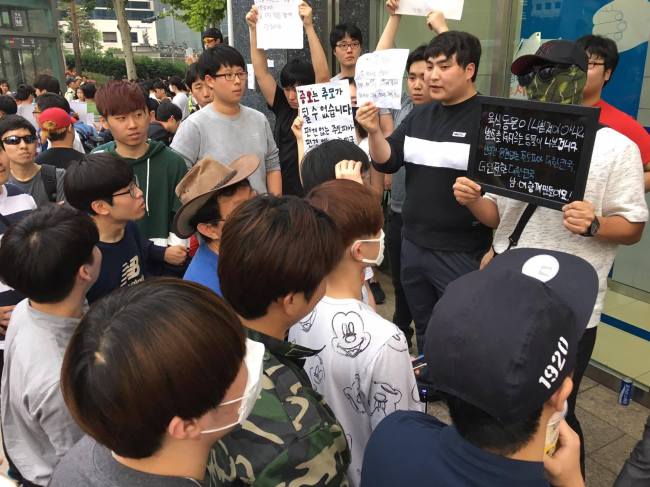 |
Pro-men activists hold up placards reading, “Not all meat eaters are bad, but only animals committing crimes are bad” and “Hatred cannot be mourning. Let’s make prejudice-free Korea” outside exit 10 of Gangnam Station on Sunday. (Ock Hyun-ju/The Korea Herald) |
“We are just here to mourn the death of the girl, hoping that such a murder against women will not happen again. Why do the men behave like that?” said Kim Eun-ji, 25, who dropped by to leave a tribute on her way to a picnic.
“I am sick of hearing that women should be careful at night and should not wear short skirts. Why don’t men know that they can also be safe when women are safe?”
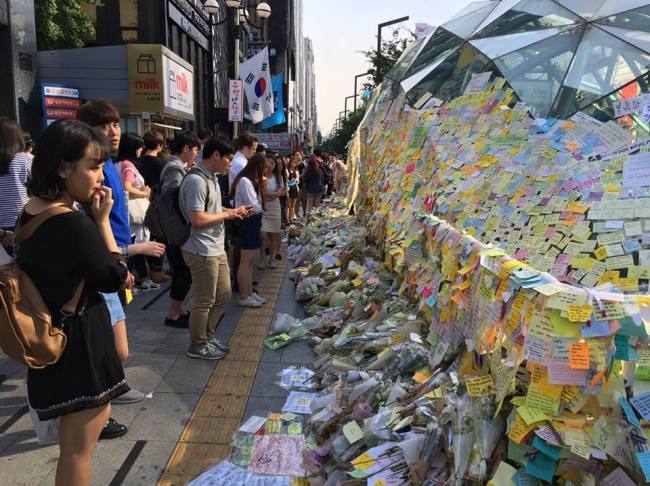 |
A makeshift memorial outside exit 10 of Gangnam Station (Ock Hyun-ju/The Korea Herald) |
On May 17, a man, only identified by his surname Kim, stabbed a woman to death at a public bathroom near Gangnam Station. The man, who was a stranger to the victim, said that he had committed the crime because he had been “belittled” by women many times in the past.
While police defined the case as an “accidental crime” committed by an individual who is mentally ill, thousands of citizens, mostly young women in their 20s and 30s, flocked to the makeshift memorial site to express their fear and anger toward what they see as a hate crime against women.
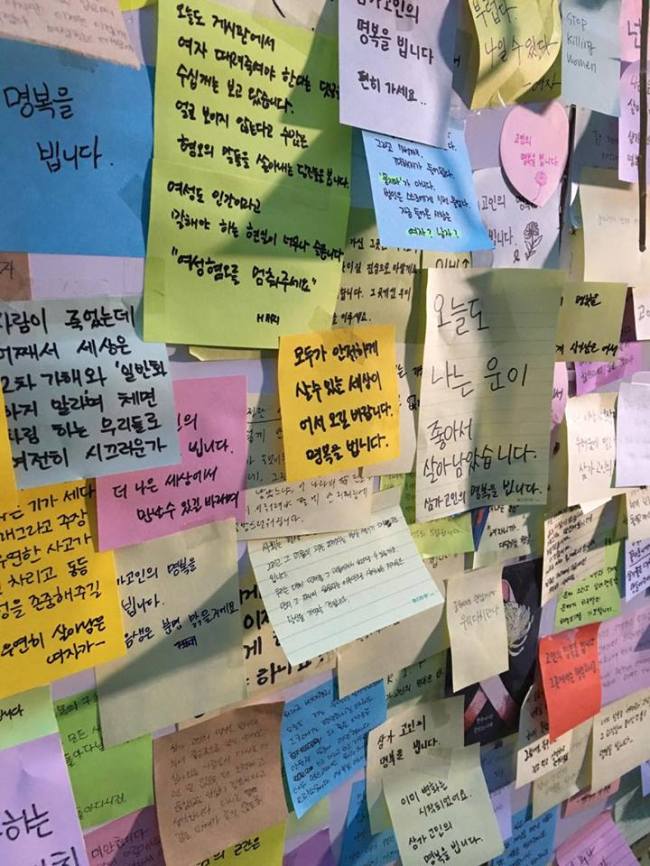 |
Post-it memos outside exit 10 of Gangnam Station (Ock Hyun-ju/The Korea Herald) |
Exit 10 of Gangnam Station soon turned into an outdoor public forum to discuss gender equality and misogyny in Korean society.
The majority of the mourners called for better safety for women and an end to gender-based discrimination. But some men expressed discomfort about being branded as “potential criminal."
“I don’t know why women keep talking about misogyny here. The criminal is an animal. An animal does not hunt animals that are stronger than them either,” said a 26-year-old student, who wished to remain anonymous. “People here are obsessed and politicizing the case. Women can kill men, too. It is not right to assume all men are criminals.”
Han Ella, one of the volunteers who has been standing watch over the memorial site since Thursday, said that men do not understand discrimination against women, because they are too used to their privileges as men.
“They are not happy because women finally spoke up and started talking about discrimination against us. We hate men despising women. We don’t hate all men. Fighting against misogyny is a matter of our survival,” she said.
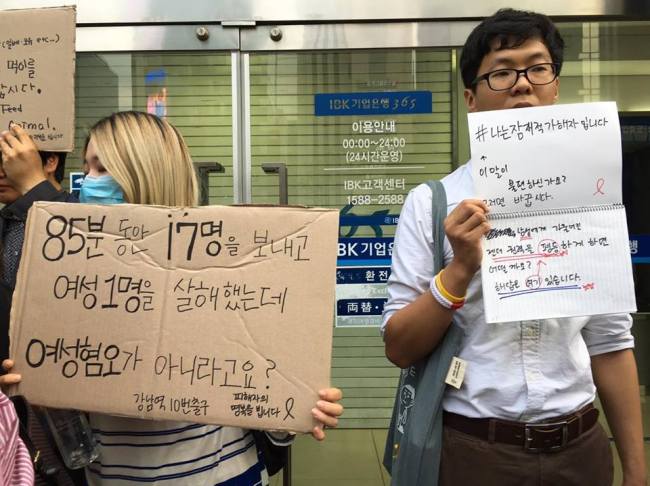 |
Mourners hold up placards opposing hate crime agasint women outside exit 10 of Gangnam Station on Sunday. (Ock Hyun-ju/The Korea Herald) |
Hong Sung-hee, 23, who majors in theater at a university, said that some radical male protestors’ behavior not only saddened but also scared her.
“I don’t know how I feel about men anymore. I feel like they will never understand what women go through in society. Why do they have to come here to disparage the movement and incite fear?” she said. “As a person who feels discriminated and sexually harassed in everyday life, I am relieved that I am not the only one feeling sick of the male-dominant society.”
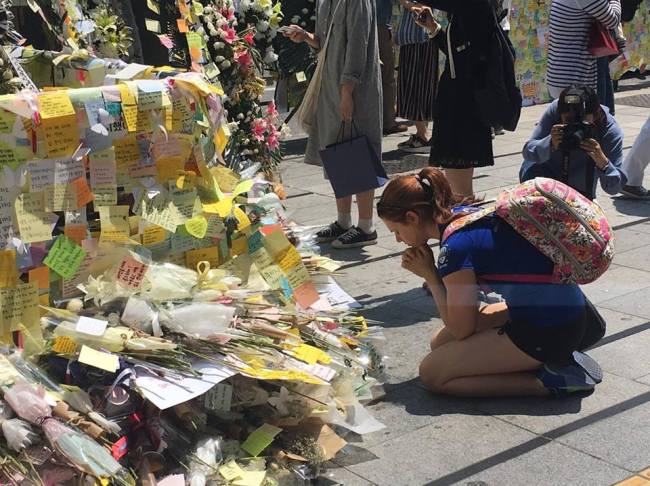 |
A foreign woman prays in front of post-it memos outside exit 10 of Gangnam Station on Sunday. (Ock Hyun-ju/The Korea Herald) |
The murder of the young girl has become a watershed moment in society, as it has prompted Korean women to publicly address the subject of misogyny and systematic discrimination against women, experts said.
Lee Na-young, a sociology professor at Chungang University, pointed out that misogyny is not a new phenomenon.
“It has always existed due to structural discrimination in the society,” she said. “But the new generation of women, who have felt ignored, harassed and insulted, are finally coming forward to speak up about the unfair treatment.”
South Korea has a high level of gender inequality -- economically, socially and politically -- ranking 115 out of 145 nations, according to the World Economic Forum last year.
“Some extreme behavior by men to deny the misogynist nature of the crime could be part of their attempt to defend the discriminative structure in the society. They are perhaps against distributing privilege to women.”
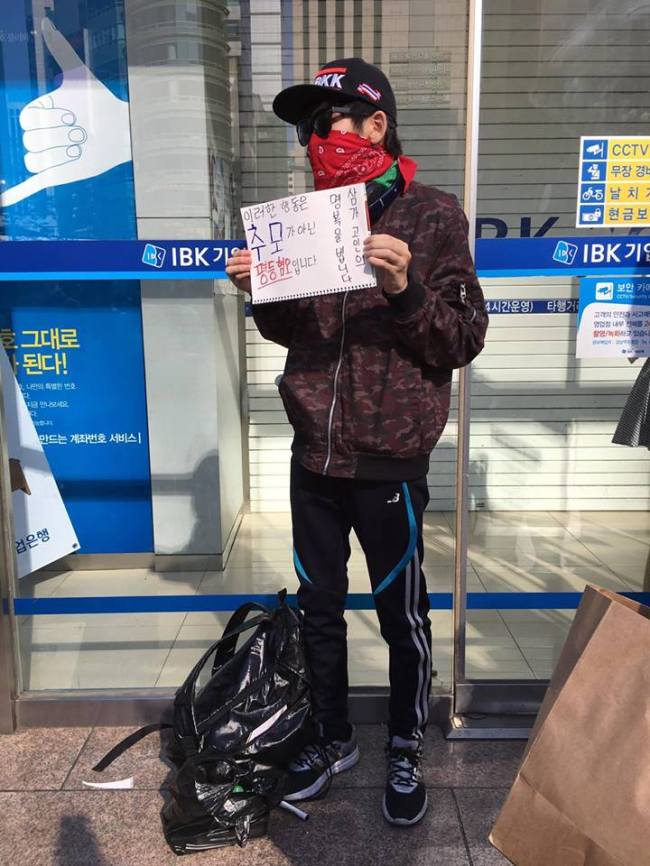 |
A man holds up a placard reading "Not all meat eaters are bad, but only those commit crimes are bad" outside exit 10 of Gangnam Station on Sunday (Ock Hyun-ju/The Korea Herald) |
The explicit emergence of modern-day misogyny began about a decade ago, when a new term “Doeonjangnyeo” (women who consume luxury foreign goods) started to be widely used on an online platform in 2006.
A website Ilbe, infamously known for its right-wing political views, was launched in 2010 and its members started to publicly disparage women online using terms such as “Kimchinyeo” and “Samilhan.” “Kimchinyeo” refers to materialistic Korean women economically dependent on men, while “Samilhan” means that women should be beaten by men at least once every three days.
In response to Ilbe members’ misogynist acts, a group of women started a website called “Megalia” in 2015 to show their hatred toward men, adding to tensions between the radical anti-women and anti-men communities.
According to a survey on 300 women by the Korea Women’s Development Institute, 83 percent of them said that they have seen such derogatory terms to describe women being widely used online. Nearly 60 percent of them expected the misogynist trend to be aggravated in the coming years.
Experts pointed out that the reasons behind the seemingly growing misogyny are the rapidly shifting gender roles, social discontent among young men who are struggling economically and the anonymity offered online.
“I think that socio-economic inequality in Korean society is a source of the hatred,” said Park Jin-kyong, a director of the Gender Research Institute. “It seems that some men, who feel marginalized, look for someone to blame for failing to get a job or to get married, for example, amid economic difficulties.”
“Their collective anger turns toward women, which is an easy target, cementing their own logic.”
Lee Soo-yeon, a researcher from the Korea Women’s Development Institute, said that some men feel insecure about escalating competition for limited resources and jobs in what used to be a male-dominant, patriarchal society.
“At home and work, they are at risk of losing a job, while they are not able to support a family without women’s help,” she said. “The reality changes, but they appear to be slower at adapting to the rise in women’s economic, social status.”
“Online platforms also contribute to misogyny because of the anonymity (it allows),” she said. “Netizens (have) started to more radically express hatred on grounds of gender, political ideology and region.”
The sex-ratio imbalance at birth is also cited as one of the factors intensifying insecurity among some men. Due to the traditional preference for sons in the 1970s and 1980s, there 1.14 males born for every female, according to the latest census in 2010.
But Kim Dong-guen, a head of pro-man rights group NGO for Gender Equality, said that the misogyny fundamentally resulted from reverse discrimination against men in society.
“Korean men suffer from reverse discrimination due to policies and institutions favoring women in college admissions and employment,” he said. “Women are biologically designed to give birth and men appreciate it, but that should not mean women can legally take away opportunities from men.”
“Korean men in their 20s and 30s have not enjoyed any power or privilege as the older generation, but our duty and responsibility as a breadwinner has not changed.”
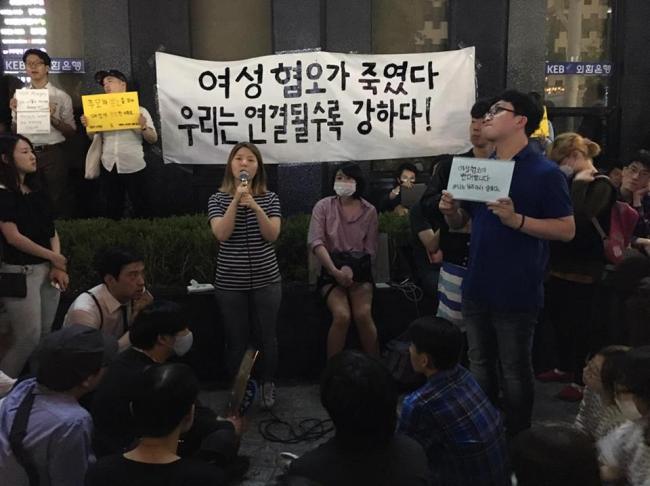 |
A woman shares her stories of living in fear as a girl in Korean soceity outside exit 10 of Gangnam Station on Sunday. (Ock Hyun-ju/The Korea Herald) |
As dusk gathered, a peaceful dialogue began among the mourners over gender discrimination and misogyny. Stories of rape, attacks and discriminations were shared, often responded by applause of support.
Most of the mourners at the scene frowned upon the extreme groups of men and women slamming each other based on gender. They said in unison that the death of the young girl should pave the way for the public discourse to tackle the discrimination and violence against women.
Kim Seong-heon, a 22-year-old university student, said that he was able to learn how much fear and discrimination Korean women have to live with at the memorial site.
“I looked back on myself to see whether my remarks have ever hurt women. I was sad to see a post-it message saying that she was sad to be born as a woman,” he said, holing up a placard “As a human being, I feel shame and anger.”
Kim Da-young, a 27-year-old officer worker, said that she has no reason to hate men.
“I am afraid to take a taxi at night. I am scared when I am alone with a man in an elevator. We are here to talk about the prevailing fear among women in the society,” Kim said. “My brother and boyfriend are all men. I don’t see them as potential criminals. I just hope that the tragic death can shed light on what women in Korea have to bear at home and work every day.”
"This is not a war between men and women. I believe that this is an opportunity for both men and women to openly talk about the issue and seek answers together.”
By Ock Hyun-ju (
laeticia.ock@heraldcorp.com)













![[Today’s K-pop] Blackpink’s Jennie, Lisa invited to Coachella as solo acts](http://res.heraldm.com/phpwas/restmb_idxmake.php?idx=644&simg=/content/image/2024/11/21/20241121050099_0.jpg)
